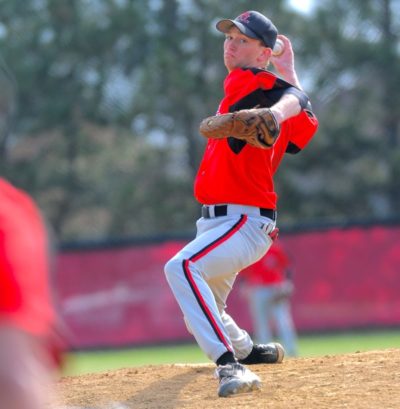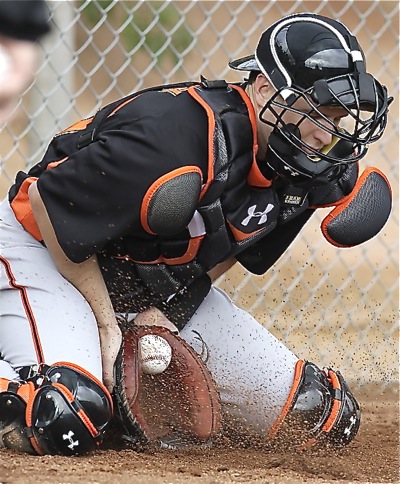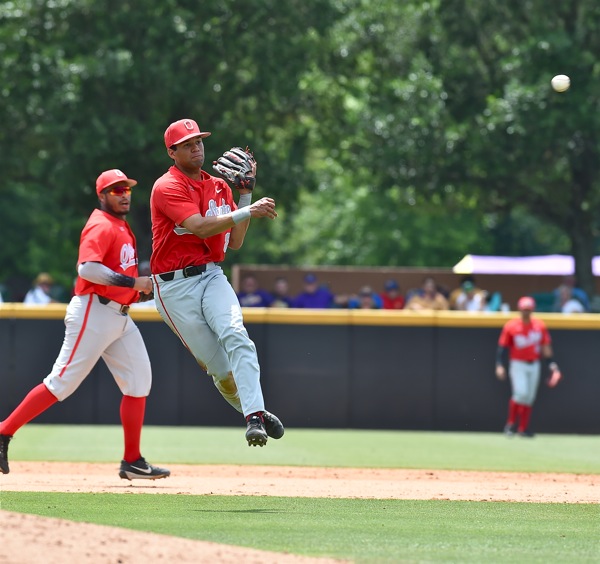Things I observed, and I heard from the weekend’s experience at the NCAA baseball regional tournament. And that is…if your son wants a college baseball scholarship, here’s some things that’ll make a difference in his being considered.
 One of the things I can tell you from my weekend’s experience at the NCAA baseball regional in North Carolina…is that games of that magnitude very often hinge on being able to execute. And by execute I mean…being able to make plays that others can’t, or don’t make.
One of the things I can tell you from my weekend’s experience at the NCAA baseball regional in North Carolina…is that games of that magnitude very often hinge on being able to execute. And by execute I mean…being able to make plays that others can’t, or don’t make.
Moving a runner. Throwing the breaking ball in a fastball count. Hitting the cutoff man in the outfield…these are just some of the fine points that drive coaches nuts under the pressure of win, or go home.
I was there covering the Ohio State Buckeyes, of course, but during the course of three days I spent time in the camera wells of both dugouts. And what I found out was…that the same things that drive Big Ten coaches mad drive coaches from the SEC, and the Sun Belt Conference mad, too.
I heard one say, word for word, prior to Saturday’s elimination game between South Carolina and East Carolina, “Son, there’s no reason for us to put you in the game if you can’t do what we put you in the game to do. Now you’d better think about that.”
The reason for writing on this topic is that there’s a lot, and a mean a lot, of parents out there who are paying significant cash to have their sons play ‘elite’, or travel baseball this summer. The thinking is…that if they play with better players, on better teams, and against better competition they’re going to get seen and hopefully offered a college scholarship after high school. It’s a good theory, but it’s far from automatic.
And here’s what I’ve observed for years of covering college baseball. Many of those same kids get to the next level and cannot execute the things that help you win a 1-1 game in the bottom of the 11th inning. And it’s not like high school where the coach pats you on the butt and tells you thanks for trying – that you did the best you could. No…he expects you to do, like the man said, what he put you in the game to do. And if you don’t do it…you’re not going to get the chance again.
You see, no one at that level really cares if you hit .350, or hit the ball 400 feet when you’re ahead 10-1. No one cares how hard you throw against teams that can’t hit the fastball, anyway. So, if you want your child to be considered for a college scholarship, here’s five things I recommend you be able to do in your sleep…if you want to get noticed apart from the rest of the competition.
Number one…be able to bunt. And I mean, be able to bunt regardless of the pitch or pressure of the game. Perfect your technique early and work on it every day. Don’t just swipe at the ball on the first two pitches in batting practice. Spend hours working on it and make a name for yourself for being dependable. Twice over the weekend I saw it hurt scoring chances for the Buckeyes because they couldn’t get a bunt down and a runner into scoring position. It may seem insignificant at the time, but it was the first thing out of the coach’s mouth after the game – “our inability to execute a bunt when we really needed it.”
Number two…work on the tough ground ball if you’re an infielder. Every spring I see infielders take ground ball after ground that’s hit right at them. But we all know that games are often lost on the chopper that a fielder has to catch with his bare hand on the dead run and make an accurate throw. They don’t practice that much, because it’s hard work, it takes patience, and frankly it isn’t much fun. It’s much more fun to try to hit the ball out of the ballpark with extra batting practice. But I’m telling you…if you want to get noticed be able to make that running play with your bare hand and with an accurate throw.

If you’re a pitcher learn to throw your breaking pitch for a strike every time you want to…especially for strike one!
Number three…be able to make contact with two strikes and put the ball in play. Currently baseball is seeing a record number of strikeouts at every level because 1) pitchers throw harder than ever before, and 2) batters are infatuated with hitting the home run because they think that’s going to get them a scholarship. If you strike out, so what? The next time you may hit it out. Except, when you have two strikes on you stats show that 80% of the time you make an out…unless if you change your swing habits. And if there are runners in scoring position and the game’s on the line…striking out is the best way of getting you a seat on the bench instead of another at bat. Choke up, shorten your swing, and put the ball into play. Jim Hardman used to say, “Make the other team field it and throw it…and they might make an error. They might hand you the game.” It worked then, and it works now. And believe me, college baseball coaches notice.
Number four…if you’re a pitcher and throw hard, that’s great. But at the college level it doesn’t really matter how hard you throw the ball because the second and third time through the lineup hitters are going to time it up and hit the snot out of it. So what you have to do is be able to throw the breaking pitch for a strike at any time in the count…including the FIRST pitch. No hitter at any level of baseball wants to swing at a curve, slider, or changeup on strike one, so if you can perfect the ability to throw a strike with one of those pitches it makes you 80% more likely to get a hitter out. Remember, YOU CANNOT GET BY at higher levels of baseball by throwing the fastball alone. Even Aroldis Chapman gets hit at 100 mph, so practice throwing the breaking ball for a strike whenever you want to…and do it in the game. You’ll be surprised at the impression that makes on scouts.

If you’re a catcher, understand that more games are won and lost on passed balls in the dirt…than on your ability to throw out runners at second base.
Number five…if you’re a catcher make yourself dependable to stop every ball in the dirt. Pitchers rely on it, coaches rely on it, and I saw it this weekend…where a passed ball or wild pitch had a devastating impact on the outcome of the game. You can’t be lazy, and you can’t take pitches for granted. If you want to get noticed behind the plate, make a reputation for yourself for being the best at blocking the ball with your chest. Again, no one really spends much time practicing this skill because it’s hard work, you get beat up, and it takes a lot of patience. And, most kids who catch believe that if they throw out 40% of would-be stolen bases that’s enough to get them a scholarship. They’re wrong. There’s more catchers in college baseball that throw out half that many…but never, ever, let a ball in the dirt get past them. That’s what keeps them on the field, and it helped them get there in the first place.
So, if you’re out there traveling this summer, enjoying the interstate and those expensive hotels on the weekends, remember that there’s a thousand just like you in the room(s) down the hall believing that by just being there it’s going to help them play college baseball. THEY’RE WRONG. If you want to play college baseball print out this page and stick it on the dashboard of your car.
Read it while you’re driving to the next showcase tournament. Take it to bed with you at night and read it as a reminder. Read it as you brush your teeth in the morning before you go to the ball diamond.
Work on the little things that make you a better ballplayer, the things that set you apart – the things that others are too lazy to work on. It’ll go a long way towards getting more playing time…and the reputation for being a baseball player that colleges might want.

Ohio State shortstop Noah West has become an excellent practitioner of the barehand grab of a chopped ground ball and an accurate running throw. It takes practice! (Press Pros File Photos)


